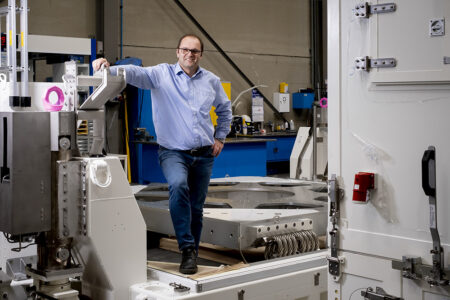Innovation has been central for Gradel ever since its creation in Luxembourg almost 60 years ago. Initially developing special purpose machines for the nuclear sector – an activity that still represents 40% of its business – the company has also developed a patented process for casting metallic spluttering targets used for coating architectural and automotive glass. However, it was its venture into the space market in 2010 that opened the door to its new speciality: ultra lightweight technology.
Unique technology
 “We started by developing mechanical ground support equipment, but we also wanted to do flight hardware components for satellites which must be very light,” recalls CEO Claude Maack. “This kicked off our work with lightweight materials. Over the past five years, we have developed a completely new technology – Gradel Robotic Additive Manufacturing, commercialised under the name of GRAM – that can be used in the composites manufacturing industry.”
“We started by developing mechanical ground support equipment, but we also wanted to do flight hardware components for satellites which must be very light,” recalls CEO Claude Maack. “This kicked off our work with lightweight materials. Over the past five years, we have developed a completely new technology – Gradel Robotic Additive Manufacturing, commercialised under the name of GRAM – that can be used in the composites manufacturing industry.”
GRAM aims to use a bionic design. It uses endless filament fibres – carbon, basalt, flex, hemp or flax – that are impregnated with any resin on the robot applicator developed in-house to realise large and complex 3D structures. The composite material created is placed strength conform in the direction of the loads, in the precise quantity needed including a safety margin. “In-between there is air, so it couldn’t be any lighter,” Mr Maack comments.
He also points out that the composite material used is highly optimised. “While standard processes drill holes in, and thus cut, the fibres to impregnate them with resin, we take the fibre around a pin. This enables us to handle five times higher loads compared to competitive processes by using 70% less material. Even if the safety margin would be doubled, our parts would remain ultra lightweight. In addition, we produce no waste.”
The extremely light 3D structures created have weight savings of up to 70%, without compromising any technical requirements. For the transport industry, this means both lower direct costs and considerable CO2 reductions. This technology is unique and complementary to all other state-of-the-art composite manufacturing processes.
Collaborative research
The patented GRAM winding equipment for lightweight structures was developed by Gradel in collaboration with the Luxembourg Institute of Technology (LIST) through an R&D project supervised by the European Space Agency that also included Airbus, Thales Alenia Space and OHB. When LIST set up its Sustainable Composite Materials & Manufacturing (SCMM) Innovation Centre, Gradel immediately became a member.
Our technology can bring enormous added value in the field of aeronautics.
Two joint projects have been launched so far. The first one, which is done in partnership with Toyota, focuses on developing a hydrogen tank with Gradel’s winding technology. Two different resins are being compared: an off-the-shelf solution and a vitrimer resin developed by the SCMM. “Vitrimer is a gamechanger in the composite industry as the fibres can be separated from the resin and reprocessed. This makes it the composite material fully circular by design,” says Mr Maack.
A second collaborative project is aimed at producing a lightweight structure for the door hinges of Airbus planes, demonstrating that the technology can meet all requirements in terms of mechanical resistance, stiffness and more. “Our technology can bring enormous added value in the field of aeronautics,” Mr Maack points out. The company is also increasingly targeting defence applications.
An excellent team
This, however, is just the beginning of the cooperation. “The SCMM is an excellent partner willing to work on technologies that are closer to market launch than many other research centres,” says Mr Maack. “The SCMM membership also enables us to have regular contacts with key industrial players.”
But the most important factor is the team. “They have a real understanding of the need to industrialise the solutions and not only do R&D. They also have some outstanding experts and are at the forefront in the field of vitrimer, which is central for composite materials in the future.”
The SCMM is an excellent partner willing to work on technologies that are closer to market launch than many other research centres.
Gradel’s ambition is that their technology will become an industrial standard in the coming 10 years. To take it even further, the company is working with Data Design Engineering, a South Korean business recently established in Luxembourg, on a project aimed at adding artificial intelligence into the entire GRAM process. “I think that the lightweight business will drive our activities in the next decades,” Mr Maack concludes.
Photo credits: Luxinnovation/Jessica Theis
